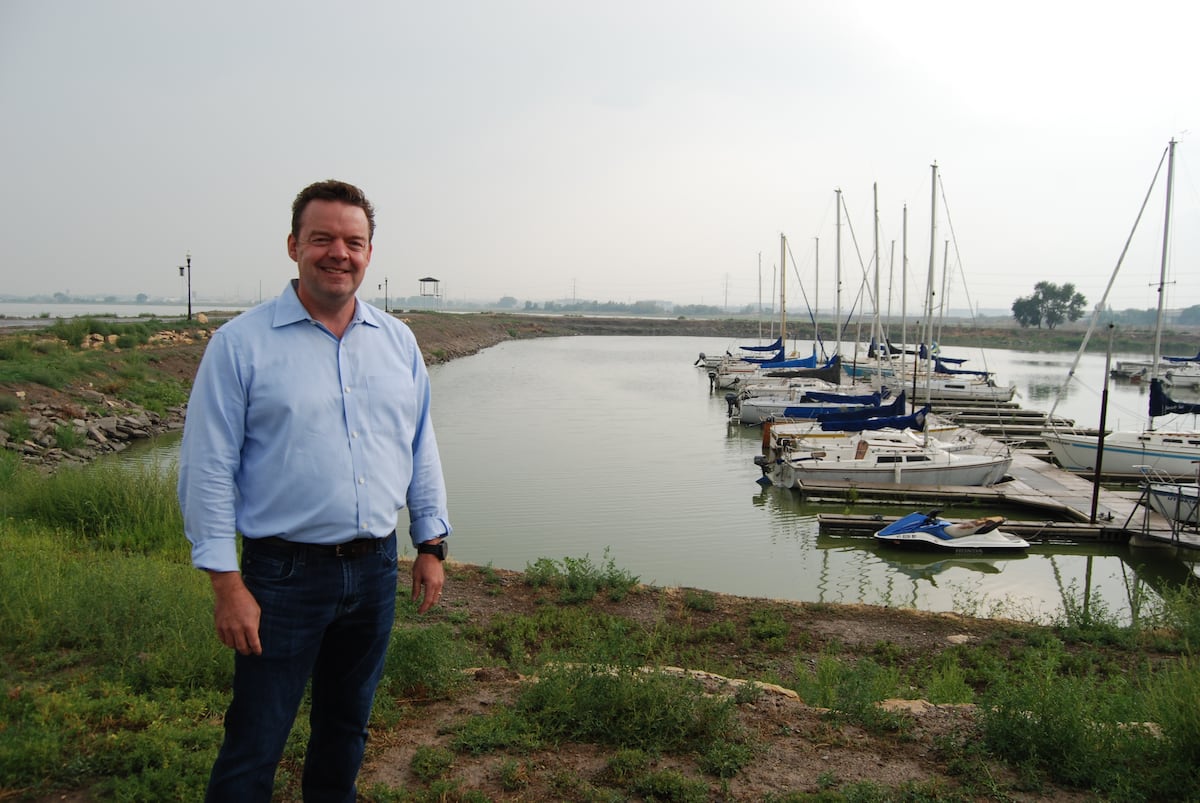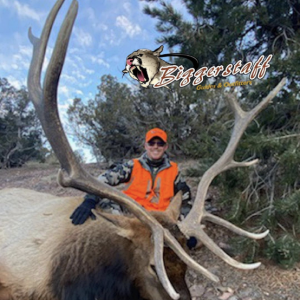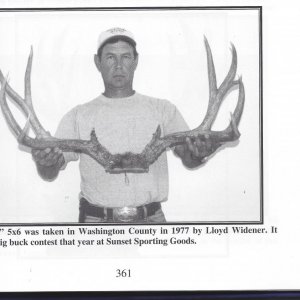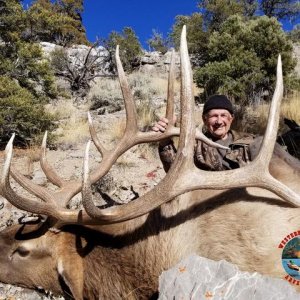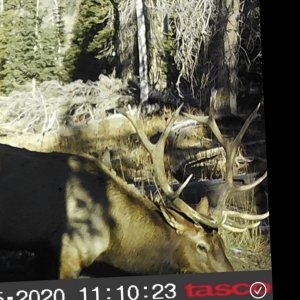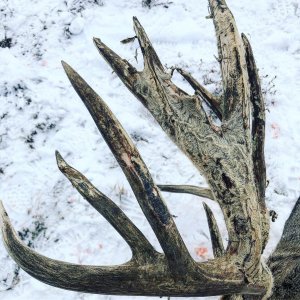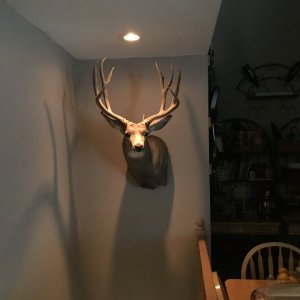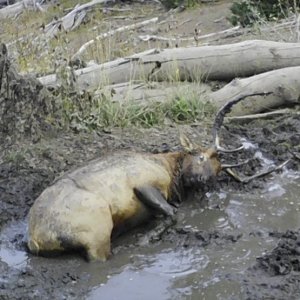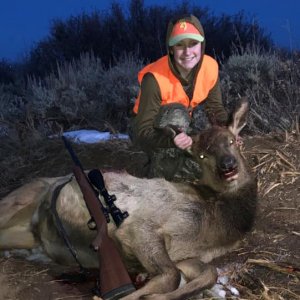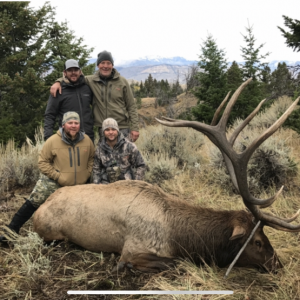For years, the state has paid millions to Big Game Forever so the organization could lobby for removing the gray wolf from the list of animals protected by the Endangered Species Act. During that time, the nonprofit kept secret how it spent these taxpayer funds.
In July 2024, Big Game Forever — co-founded by Utah lawyer and hunter Ryan Benson — was finally ordered to release documents about its subcontractors. The state now has disclosed records covering two years of spending, from mid-2018 to mid-2020.
The documents show major payments to Ryan Benson’s own company, Stag Consulting, and to Stoneworth Consulting, which is owned by his brother, Jon Benson. Jon Benson’s involvement and receipt of taxpayer money from Big Game Forever had not previously been publicly known.
And Jon Benson was shown to be working hundreds of hours on delisting the wolf at the same time he listed himself as president of Lake Restoration Solutions, a company that had a high-profile, controversial plan to dredge Utah Lake to create 18,000 acres of artificial islands.
During those two years, Big Game Forever spent over $1.3 million on “public outreach” and Jon Benson billed nearly 20% of the hours in that category. The documents indicate the percentage of a spending category each subcontractor received, not actual dollar amounts.
The fight over the transparency about the organization’s spending goes back to 2020, when the Utah State Records Committee
ordered Big Game Forever to disclose to The Utah Investigative Journalism Project the names of subcontractors it had paid using millions of taxpayer dollars.
Big Game Forever sued in the 3rd District Court to keep the records secret for the next four years. After losing in district court, it appealed to the Utah Court of Appeals,
which said the records should be released unredacted.
During this legal battle, Ryan Benson joined Jon Benson in leadership at Lake Restoration Solutions. The plan to dredge Utah Lake would ultimately fail, but not before the company pursued one of its critics in court.
Lake Restoration Solutions sued Brigham Young University plant and wildlife sciences professor Ben Abbott for defamation in 2022 over his public criticism of the company’s claims that it would be able to help clean up the lake with its massive development project. That suit was
dismissed in 2023 and ruled by a judge to be an abuse of the legal system.
Abbott was surprised to learn that Jon Benson had received taxpayer money from Big Game Forever. “It was always hard to assess when interacting with Ryan and Jonathan who was making the decisions and where was all the bad judgment coming from,” Abbott said.
Abbott said he was aware that another Ryan Benson project, a separate nonprofit called Big Game Forever Foundation, had a connection to Lake Restoration Solutions, based on the company’s
bankruptcy filings. Big Game Forever has a nonprofit designation that allows it to lobby on issues. Big Game Forever Foundation is a traditional charitable nonprofit.
The newly released documentation, he said, “I think, shows that that collaboration [between the brothers] went back a lot longer.”
Jon Benson refused to comment about his work for Big Game Forever. Ryan Benson did not respond to questions sent to him through his lawyer and his brother about his work for Big Game Forever, for the separate charitable foundation and for Lake Restoration Solutions.
Big money
View attachment 155531
(Colorado Parks and Wildlife) The state of Colorado's Parks and Wildlife agency released five gray wolves onto public land in Grand County, Colorado in December 2023. Pictured is wolf 2302-OR, a juvenile female. Anti-wolf advocates are concerned that Colorado's wolves could enter Utah.
In 2011, the Utah Legislature put the gray wolf in its crosshairs. That year, Sen. Allen Christensen, R-North Ogden, sponsored SCR15 calling on Congress to delist the wolves; during a
committee hearing, he warned about the threat they posed to wildlife, livestock and rural economies. He acknowledged wolves were not a threat in Utah like they were in states like Montana, but he likened wolves to a “cancer” that needs to be contained before it spreads.
More significantly, that year, the Legislature began appropriating funding to be administered by the Division of Wildlife Resources, or DWR, to accomplish delisting. DWR passed this funding to Big Game Forever. The organization initially received $100,000 a year.
Big Game ultimately burned through an additional
$5.1 million from the Legislature for the anti-wolf campaign, an amount confirmed by DWR. The group claimed victory in 2020 when the Trump administration removed the wolves from the endangered species list. A federal judge
reversed that decision in 2022.
While the project was heralded by many Utah lawmakers worried about predators destroying livestock and big game populations, there were also repeated concerns about the lack of transparency regarding how the nonprofit was spending state money.
A
2013 legislative audit found the nonprofit was getting paid upfront, even before establishing progress on its goals. The auditors also warned that the nonprofit was mixing state and private funds.
In 2018, Big Game Forever was required by DWR to disclose the names of its subcontractors to state officials. The organization’s last two annual reports, dated July 2018 to June 2019 and July 2019 to June 2020, on its anti-wolf expenditures showed that it spent $2.5 million — with the lion’s share, $1.3 million, going to “public outreach.” The names of the nine subcontractors were redacted when the report was released to the public.
The unredacted version recently obtained by The Utah Investigative Journalism Project shows Jon Benson’s Stoneworth Consulting billed 2,163 hours in total, with 1,556 hours in the public outreach category. He also billed the most hours — 387.4 — in the “administrative” category. That work occurred during the same time he listed himself on
his professional page as president of Lake Restoration Solutions.
It also shows the number of hours other subcontractors worked in different expense categories, without disclosing exactly how much they were each individually paid.
One entity, Lumley & Sons, billed 2,795 hours of public outreach work. There is no Lumley & Sons registered in Utah, but the name matches an email associated with Matt Lumley, president of the Montana Trappers Association and vice president of the National Trappers Association. Lumley is also listed on
Big Game Forever’s website as the regional director for Montana and Wyoming. Lumley did not respond to a request for comment.
In June, The New York Times
reported on how Lumley had caught a Yellowstone wolf in a steel-jawed trap and, instead of killing or releasing it as soon as it was discovered per Montana law, he instead alerted Montana Gov. Greg Gianforte, who traveled from hours away to shoot the wolf in violation of state regulations.
The unredacted documents also identified two subcontractors who provided “legislative” work: Dutko, a major lobbying firm based in Washington, D.C., which billed 505 hours, along with Hartley & Associates, a Utah lobbying firm that billed 652 hours.
During the time he was billing Big Game Forever for this work, Jeff Hartley, of Hartley & Associates, was also lobbying for Lake Restoration Solutions. Hartley was a partial owner in the company,
according to disclosures Ryan Benson made during a Sept. 12, 2023, bankruptcy hearing.
According to a 2013 audit, Big Game Forever would not be allowed to spend state funding to lobby the state. It’s unclear why a state-based lobbyist would be needed when the Legislature had already endorsed the project with millions of dollars over the years, and Hartley refused in a text to answer questions about his work for both entities.
The state report also lists an entity named Two Feathers LLC as having billed 1,881 hours of “public outreach.”
Division of Wildlife Resources spokesperson Faith Jolley said any questions about that company would have to be answered by Big Game Forever. “DNR/DWR did not receive detailed information on the roles of each of the subcontractors,” Jolley said.
A 2019
report Big Game Forever produced did note Two Feathers Custom Hunting Bows in Colorado as a supporter of its efforts to remove the wolf from the endangered species list. Company owner Denny Behrens had
also advocated for wolf-delisting in Colorado. Behrens did not respond to a request for comment made by phone.
Abbott said he finds the lack of oversight troubling. “The fact that we can’t get answers from government agencies about what was done and for how much, it highlights the additional risk of these public-private partnerships,” Abbott said.
‘Brains and brawn’
Other subcontractors listed include Peay Consulting, owned by Don Peay, a longtime big game advocate who previously founded Sportsman for Fish and Wildlife, co-founded Big Game Forever and successfully lobbied for past legislative appropriations for the wolf delisting campaign. He billed 1,092 hours “public outreach” work and “direct action,” according to the state reports.
Peay would not comment on any other Big Game Forever subcontractors, such as Jon Benson, or on the amount of compensation he received for his work, except to say it was “pretty well below fair-market value.”
Peay was listed as a director for Big Game Forever in 2011 when it was first formed, but notes that he was not with the organization when it received state funding. He says that he continued the work well after his contract with Big Game Forever expired in January 2020.
(Al Hartmann | Tribune file photo) In 2013, Don Peay of Sportsmen for Fish and Wildlife, right, spoke before the House Natural Resources, Agriculture, and Environment Committee. Peay was affiliated with Big Game Forever, an anti-wolf advocacy group, which was seeking $300,000 from the Utah Legislature that year.
“I continued to work until the end objective was achieved, which was wolf-delisting,” Peay said.
He says the work he did was based on previous networks and connections he built back in 2010 when he helped advocate for the amendment to the Endangered Species Act that in 2011
delisted the gray wolf in Montana, Idaho and eastern portions of Washington and Oregon through bipartisan support.
“I was the brains and brawn behind a huge national, grassroots effort to get bipartisan support [for the delisting],” Peay said. “When people understand what wolves are, they understand they need to be managed.”
The documents listed another entity the state could not identify, JB Inc., that did public outreach and administrative work between 2018 and 2019.
The 2018-2019 report had an “education/science” category that was not in the later report. In that category, Ryan Benson paid his own consulting company for 131 hours of work. Ryan Benson’s professional background is as a lawyer, although his
biography page on Big Game Forever’s website says he minored in zoology in college. His brother Jon Benson also billed 220 hours in the “education/science” category.
Over the two-year period, Ryan Benson’s Stag Consulting billed for 2,795 hours, mostly for “legal” work. Big Game Forever also billed the state a combined $32,298 for travel expenses.
In both reports, Big Game Forever touted the importance of public outreach through social media, citing more than 430,000 followers on social media.
“Big Game Forever has been very effective at growing its public outreach capabilities and has a level of engagement unmatched by other groups,” the report stated.
The organization’s
Facebook page lists 413,000 followers. But the majority of the posts are photos from other sites of hunters’ trophy kills from across the country and reposts of wildlife related news. Far fewer posts advocate for delisting the gray wolf.
After a federal judge in California reversed the Trump decision in February 2022 and once again protected the gray wolves across most of the country, Big Game Forever’s Facebook page said nothing about the decision and it stopped posting shortly thereafter.
Big Game Forever hasn’t had a contract with the state since 2020. Last year, Utah lawmakers gave Kansas-based nonprofit Hunter Nation $500,000 for anti-wolf lobbying. In the 2024 session, Peay and Sen. Derrin Owens, R-Fountain Green,
urged the Legislature to do it again.
Instead, members appropriated $250,000 for “state management of wolves” while stipulating that an audit will be conducted on past anti-wolf lobbying payments before the money is paid out. The funds also will be used to reimburse expenses, not paid up front, and the documentation filed in support of obtaining the money will not be redacted, lawmakers insisted.
Wolves are protected as an endangered species in Utah, except for a small corner of northeast Utah that is considered part of the wider Yellowstone region where the predator is in recovery.
View attachment 155532
(Utah Legislature) Don Peay, left, and Sen. Derrin Owens answer Utah lawmakers' questions about their $500,000 appropriation request for anti-wolf lobbying by Hunter Nation on Thursday, Feb. 1, 2024.
Entwined finances
Lake Restoration Solutions’ plans to build islands in Utah Lake
were sunk in 2022 when the Utah Attorney General’s office determined that the proposal would violate the state constitution by giving away “sovereign lands” to a private company. In 2023, the company filed for bankruptcy.
Before the bankruptcy, Lake Restoration Solutions paid $80,000 to Ryan Benson’s Big Game Forever Foundation for “intellectual property.” And the charitable foundation forgave a $250,000 loan to Lake Restoration Solutions, according to
court filings.
Ryan Benson said in the bankruptcy hearing he could not find a document for the loan. He also did not respond to questions from The Utah Investigative Journalism Project about the loan. His bankruptcy attorney said that the loan from the foundation did not come from the state funds paid to the separate Big Game Forever nonprofit that had the contract to delist the gray wolf.
Jeff Hunt, an attorney at Parr, Brown, Gee & Loveless who represented the Utah Investigative Journalism Project in the yearslong battle for the records, said the decision forcing Big Game Forever to turn over the documents was a “big win.”
He notes that because of the litigation, the district court and Utah Court of Appeals refuted the idea of the identity of subcontractors being “trade secrets” and “created some important legal precedent that the public has a right to know the identities of contractors who perform work on government contracts,” Hunt said.
On top of that, in 2022 the Utah Department of Natural Resources, which defended the denial of records in court, was ordered to pay attorneys’ fees for The Utah Investigative Journalism Project in the amount of $146,349.50. The next year, the Legislature passed
SB231 so that the state would no longer necessarily foot the bill for companies that want to keep records secret.
“The core principle of Utah’s sunshine laws is that the people’s business should be conducted in public,” Hunt said. “That is especially the case when we are talking about entities receiving millions in taxpayer dollars.”
